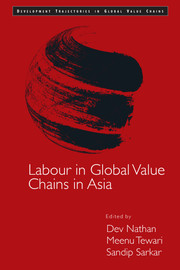Book contents
- Frontmatter
- Contents
- Figures
- Tables
- Foreword
- Preface
- Acknowledgements
- Introduction
- Captive Governance
- Modular Governance
- 11 From Disposable to Empowered: Rearticulating Labour in Sri Lankan Apparel Factories
- 12 Scripted Performances? Local Readings of ‘Global’ Health and Safety Standards in the Apparel Sector in Sri Lanka
- 13 Diffusing Labour Standards Down and Beyond the Value Chain: Lessons from the Mewat Experiment
- 14 Social Upgrading in Mobile Phone GVCs: Firm-level Comparisons of Working Conditions and Labour Rights
- 15 The Politics of Global Production: Apple, Foxconn and China's New Working Class
- 16 New Strategies of Industrial Organization and Labour in the Mobile Telecom Sector in India
- 17 Global Production Networks and Labour Process
- Relational Governance
- Conclusions
- Notes on Contributors
- Index
17 - Global Production Networks and Labour Process
from Modular Governance
Published online by Cambridge University Press: 23 July 2017
- Frontmatter
- Contents
- Figures
- Tables
- Foreword
- Preface
- Acknowledgements
- Introduction
- Captive Governance
- Modular Governance
- 11 From Disposable to Empowered: Rearticulating Labour in Sri Lankan Apparel Factories
- 12 Scripted Performances? Local Readings of ‘Global’ Health and Safety Standards in the Apparel Sector in Sri Lanka
- 13 Diffusing Labour Standards Down and Beyond the Value Chain: Lessons from the Mewat Experiment
- 14 Social Upgrading in Mobile Phone GVCs: Firm-level Comparisons of Working Conditions and Labour Rights
- 15 The Politics of Global Production: Apple, Foxconn and China's New Working Class
- 16 New Strategies of Industrial Organization and Labour in the Mobile Telecom Sector in India
- 17 Global Production Networks and Labour Process
- Relational Governance
- Conclusions
- Notes on Contributors
- Index
Summary
Introduction
In the last few decades, the modus operandi of global capitalism has been subject to significant restructuring. One major aspect of this is the transnationalization of production, i.e., the separation and segmentation of production processes across different regions or factories all over the globe. This phenomenon is often described as the ascendancy of global production networks (henceforth GPN). The different ways of conceptualizing such ‘functionally integrated but geographically dispersed’ (Gereffi and Korzeniewicz, 1994) systems of production—global commodity chains (GCCs), global value chains (GVCs) and global production networks— explain the production, distribution and consumption of goods and services in similar terms, i.e., as networks of interconnected functions and operations (Coe et al., 2008). In our view, the GPN framework best captures the complex (and often non-linear) dynamics of global capitalist production embedded in socio-spatiality. The framework's scope allows the location of the agency of various actors in the transnational space, to see how they shape the economic and political context around them. Because of its greater analytical openness to a complex reality, this framework also allows for productive dialogues with different branches of heterodox economics and beyond, including labour process theory, which is of particular importance in this paper.
Underpinning the GPN framework is the idea that there is increasing global competition between multinational companies to tap into new markets, use cheap labour to exploit economies of scale and to cut down the cost of production (Gereffi et al., 2001; Humphrey, 2003). Further, a substantial strand in the literature views this as a positive development on the grounds that it leads to economic, technical, and social upgrading in the firms that work within a GPN. This in turn is often seen to lead to the acquisition of advanced manufacturing technology (AMT) in host countries, as well as increasing workers’ skill levels and affording them greater autonomy in the production process (Womack et al., 1990; 2007). However, there are also arguments that suggest that instead of improving conditions for workers, GPNs may result in worsening their conditions of work and well-being (Harvey, 2010; Foster et al., 2011; Bose, 2012).
- Type
- Chapter
- Information
- Labour in Global Value Chains in Asia , pp. 398 - 420Publisher: Cambridge University PressPrint publication year: 2016
- 2
- Cited by

